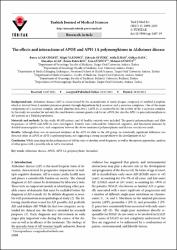The effects and interactions of apoe and aph-1a polymorphisms in alzheimer disease

Göster/
Erişim
info:eu-repo/semantics/openAccessTarih
2015Yazar
Acar Çinleti, BurcuYardımcı, Nilgül
Aytürk, Zübeyde
İlhan, Atilla
Kaya, Gülhan
Acar, Muradiye
Koç, Emine Rabia
Gündüz, Esra
Üst veri
Tüm öğe kaydını gösterÖzet
Background/aim: Alzheimer disease (AD) is characterized by the accumulation of senile plaques composed of amyloid beta-peptide, which is derived from beta-amyloid precursor protein through degradation by beta-secretase and.-secretase complexes. One of the major components of gamma-secretase complex, anterior pharynx-defective-1 (APH-1), is responsible for the activity of the.-secretase complex. In this study, we searched for not only the most known common genetic risk factor, APOE, but also the APH-1a gene polymorphism in AD patients in a Turkish population.
Materials and methods: In this study, 49 AD patients and 45 healthy controls were included. The genetic polymorphisms and allele frequencies of APOE and APH-1a were investigated. Patients were evaluated for behavioral, cognitive, and functional domains by detailed neurocognitive tests, and comparison between the above-mentioned polymorphisms and disease severity was made.
Results: Although there was an increased tendency of the APO epsilon 4 allele in the AD group, no statistically significant difference was detected either in APOE or APH-1a polymorphisms, not suggesting a strong susceptibility to the development of AD.
Conclusion: While searching for the pathogenesis of AD in order to develop novel diagnostic as well as therapeutic approaches, analysis of other genes with a possible role in AD is warranted.

















